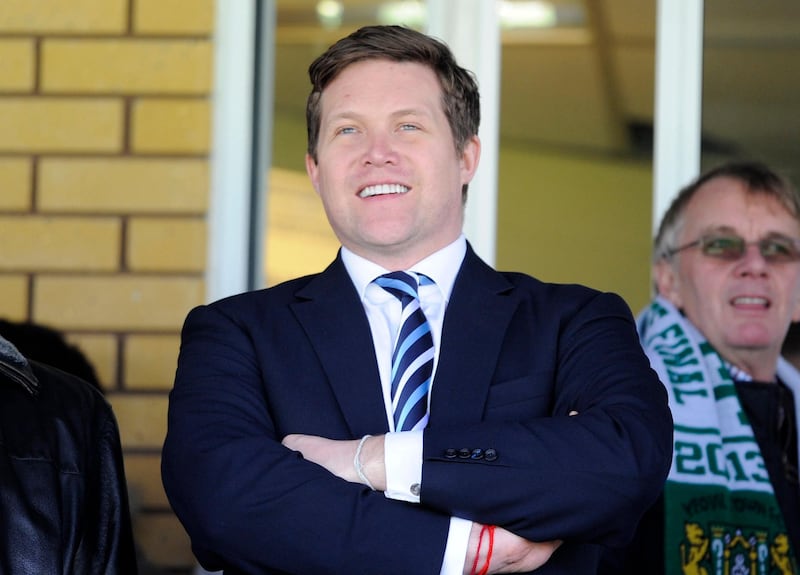A British activist who portrays himself as a solicitor on a website that campaigns for people involved in brushes with the law in the UAE does not have a certificate to practise law in the UK, the profession's regulatory body told The National.
David Haigh, who last month announced an alliance with Qatar to create a “new association for victims of torture”, was found liable in 2015 of breach of trust in relation to a dispute over Dh21 million owned by GFH Capital, a financial company based in the Gulf.
Mr Haigh regularly makes media appearances and organises protests on behalf of the Detained in Dubai campaign. It offers its services on the website detainedindubai.org, which names its leading figures as Mr Haigh, describing him as solicitor, the London-based businesswoman Radha Stirling as founder and a third man, Shahid Bohsen, as consultant.
A press release also described him as a solicitor after a protest outside the UAE Embassy last month.
Yet the Solicitors Regulation Authority (SRA) requires solicitors to hold a practising certificate if “your involvement in the firm or the work depends on your being a solicitor; you are held out explicitly or implicitly as a practising solicitor; you are employed explicitly or implicitly as a solicitor”.
The SRA told The National that Mr Haigh had not applied for permission to continue his legal work after his practising certificate lapsed in 2014.
A spokesman for the SRA said that only regulated and fully paid-up solicitors could perform certain legal activities. And even if they were performing other legal tasks, they should make explicit they are a non-practising solicitor.
“He has not got a practising certificate at this time and has not had one since 2014, which means he cannot act as a solicitor carrying out any of the six reserved legal activities,” the spokesman said.
“We know that he has spent time in prison because we gather information on the regulated community. When an application is made we assess all admissible evidence, but obviously we cannot speculate what his intentions might be in the future.”
In a statement, Detained in Dubai said: “We are in full compliance with all legal requirements relevant to the provision of our services, as is Mr Haigh. This firm does not provide any reserved legal activities in the UK. Like any firm we will not discuss our charging structure, this is a matter for us and our clients.”
Following queries to Mr Haigh by The National the website now states that he is not practising in his profile.
Detained in Dubai emails have offered potential clients services including “working” and “co-ordination” with their appointed legal teams as recently as this year.
“It is not all clear to their clients that this is in effect consultation. The documentation offers their clients activities that look like legal work,” said one source with knowledge of the firm’s services. “They are charging, in some cases, thousands of pounds for services that are really about representing their case with contacts and campaigning in the media.”
The National spoke to two clients of Detained in Dubai, one of whom paid a substantial fee for its services.
One case involved a US citizen who was teaching in Abu Dhabi before bouncing two cheques and being jailed for 17 days in 2015. She is now subject to a travel ban and has sought advice on how to resolve her situation so she can return to the US.
The second case involved a medical negligence dispute with the family of the Pakistani victim who suffered brain injuries seeking advice on how to resolve a claim for damages that reached stalemate in Dubai’s courts.
The family claimed to have paid out thousands of euros in advance to Detained in Dubai to help raise the profile of the case.
Payments were made in two instalments after a meeting in Spain. Since then, communication has broken down between the family and DiD.
Mrs Stirling registered the company, Detained in Dubai Ltd, with Britain’s Companies House on March 11. She had previously been the sole owner of a company, Detained in Dubai, that was registered with the same body in 2009 but compulsorily dissolved in March last year.
Mr Haigh and Mrs Stirling are both listed as directors of another British business, Stirling Haigh, which is described on its own website as “Dubai’s best criminal law advisory” – it was founded in January last year.
A third body, Du Justice, was established in last October at Britain’s Companies House by Mr Haigh and while Du Justice is a private company, it is limited by guarantee, typically an option when the founder wishes to run it as a charity. There is a donate button on its website.
The National has established there is no trace of Du Justice on the Charity Commission register, so its self-described role as a charity has not been confirmed. British charities enjoy a unique legal framework and are exempt from corporation tax. The firm's Articles of Association state: "The company's name is Du Justice (and in this document it is called the "charity")."
Mr Haigh and his partner work on cases of British holidaymakers and others who have been caught up in legal disputes in the UAE, particularly Dubai.
Mr Haigh was deported from the UAE and is pursuing an appeal against a court order freezing his global assets, according to media interviews.
Mr Haigh was held in Dubai until March 2016, during which time he set messages on Twitter that praised his treatment in custody. It was only after returning to Britain that he launched accusations of torture and mistreatment while in prison.
“Meantime my thanks too to Dubai authorities – courts, public prosecution, police for their honour and professionalism. This NOT their fault,” he wrote in 2014.
The dispute took place after Mr Haigh’s involvement in a failed attempt to buy control of the English football club Leeds United. The judgment shows the court heard that Mr Haigh used his position to approve payments of “false invoices”.
The court was then told that Mr Haigh authorised payment of these invoices into his own bank account and one in the name of Rafael Yotiama.
“The defendant has transferred such amounts while the defendant is the trustee on such amounts, which are payable to the victim company and he embezzled such amounts for himself,” the judge at the Court of First Instance stated.
“The defendant disposed of such amounts of money as if he is the owner and transferred such amounts of money to his personal accounts with a view at (sic) embezzling such amounts of money.”
Since returning to Britain, Mr Haigh has resumed his interest in politics as well as maintaining a steady stream of commentary on the Gulf via Twitter. On his Twitter site he uses the title councillor, having taken an uncontested seat on the Altarnun Parish Council, an entity on the lowest administrative rung in England.
One of Mr Haigh’s most recent involvements has been with the case of Lucas Belmonte, who was given a one-year sentence in the UAE after trying to pay for a luxury holiday with a credit card that was not his own.
Belmonte was previously sentenced by the English courts for sending a threatening communication. The sentence was handed down by a British court after charges of blackmail, demanding £1,000 (Dh5,185), and conspiracy to supply cannabis were withdrawn.






